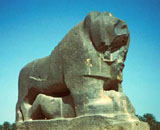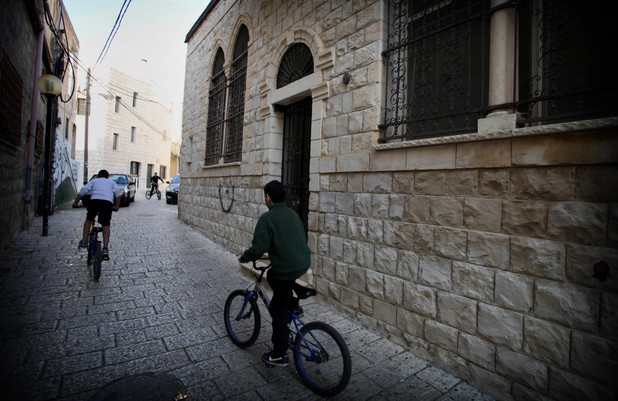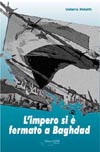Palestinian residents of Tarshiha received backlash for protesting Israel’s war on Gaza this summer.(Saeed Qaq / APA images)
October 17, 2014
Osama Tannous has long campaigned for the municipal independence of Tarshiha, his hometown in the Galilee region of present-day Israel.
For decades, Tarshiha has been administratively connected to the neighboring Jewish-Israeli community of Maalot and the two share a municipality.
On all government records, paperwork and tax documents, the two have, since 1963, been classified as the town of Maalot Tarshiha. Yet the communities are geographically separated and local Palestinians have been campaigning for independent representation and municipal sovereignty for decades.
"It’s important to control your own land, institutions and budget," Osama, a 29-year-old activist and pediatric physician, told The Electronic Intifada. "It is also politically necessary to break away from a colonial entity that was built on our land with a view that we’re the enemy."
In addition to their uniquely challenging situation, Tarshiha’s indigenous villagers face the same institutionalized discrimination as the rest of the estimated 1.7 million Palestinian citizens of Israel. More than fifty laws curb their political freedoms and limit their access to state resources — most importantly land.
On 24 October, the villagers will mark the sixty-sixth anniversary of when Israel occupied the village — five months after the State of Israel was established in May 1948.
The tragedy will be commemorated with tours for children. The tours will focus on life before the Nakba (Arabic for catastrophe), the ethnic cleansing of Palestine in 1948, as well as the village’s links to iron industry and tobacco production.
There will also be music events and small exhibitions, including photography collections illustrating the massive changes imposed on Palestinian life in the village.
"Destroying our existence"
Osama Tannous said that Israel often claims that the joint municipal project in Maalot and Tarshiha is an example of coexistence between Jewish Israelis and Palestinians, a claim roundly rejected by most of the indigenous Palestinian residents.
"Maalot was established deliberately to usurp Tarshiha and to eventually destroy our existence," he said.
Locals also accuse the Israeli land authorities and the local municipality of land theft and systematically privileging their Jewish Israeli counterparts over Palestinians.
"When Maalot takes land that belongs to Tarshiha, it is technically done in a 'legal’ way … because we are classified as part of the same municipality," said Nakhleh Tannous, a city council representative and a member of Balad, a political party representing Palestinians in Israel.
Israeli authorities recently began building Oranim, a religious Jewish neighborhood in Maalot on the outskirts of Tarshiha’s present-day borders. "This one neighborhood will have about the same number of houses as all of Tarshiha," Nakhleh added.
"We all know that Maalot is allocated a larger portion of the [municipal] funds," Nakleh explained. "It’s clear that they get more resources than we do."
"But it’s impossible to calculate the disparities — how much they take and we don’t. On paperwork, it all goes to the same place. But we are certain that being connected to Maalot’s municipality hurts us a lot."
Blocking independence
A member of Israel’s parliament, the Knesset, during the 1990s, Shlomo Bohbot has been the mayor of Maalot since 1976.
Bohbot has repeatedly denied and blocked Tarshiha’s attempts to gain municipal independence. Ten years ago, when locals began a basketball team for Tarshiha’s youth, Bohbot pulled the funding because locals didn’t include Maalot in the team’s name.
"We raised money on our own to keep the team going," Nakhleh said.
Today only three Palestinians are allotted seats on the thirteen-person municipality. Together, they represent the entirety of the estimated 5,000 Palestinians living in Tarshiha.
Zionist forces occupied Tarshiha on 24 October 1948 during Operation Hiram, a military offensive that aimed to expel as many Palestinians as possible from the Galilee region of historic Palestine.
Only approximately 500 of the estimated 5,000 villagers in Tarshiha were able to stay or return following the Nakba.
Zochrot, an Israeli organization that seeks to raise awareness about the Nakba, has cited estimates that the number of Tarshiha’s refugees has swelled to 60,000 due to family growth.
Nakhleh said that the problematic joint municipality "is a continuation of the Nakba. The inequality today can only be understood by looking the village’s history since the Nakba."
Maalot was founded on Tarshiha’s land in 1957, mostly by Jewish Arab settlers from North Africa. Another seven moshavim and kibbutzim — semi-cooperative Jewish agricultural settlements — also sit atop land that belonged to Tarshiha before the Nakba.
Israel’s interior ministry has stated that the purpose of Maalot’s establishment was to prevent an independent council being set up to cater for Tarshiha’s indigenous residents.
In 1963, Tarshiha was officially absorbed into Maalot’s municipality.
Famous for tobacco
Due to the brutal assault Israel launched on the town, using warplanes to bomb large swathes of it, most of the indigenous residents fled to Lebanon and Syria. Today the surviving refugees and their descendants are in refugee camps in cities across southern Lebanon, as well as in and around the Syrian capital Damascus.
Mahmoud Abu Hassan, 87, has farmed tobacco on Tarshiha’s agricultural lands for more than seven decades. Referring to a destroyed Palestinian village about twelve miles away — near Israel’s present-day boundary with Lebanon — he recalled that "until 1948 our lands used to stretch all the way to Iqrit."
"Tarshiha was famous for its tobacco production," he said. "After the Nakba, most of our lands were taken and Israeli companies had a monopoly on tobacco."
"We also sold locally grown wheat and produce to places all across Palestine, like Nablus and Gaza," Abu Hassan added. "That mostly stopped because our best lands were taken and we didn’t have access to water as much as before [the Nakba]."
Though most of his family became refugees in Lebanon and Syria, Abu Hassan and his remaining immediate relatives in Tarshiha are one of the last families still farming tobacco in the village.
Incitement
Eight Jewish-Israeli settlement communities — including Maalot — have been built on Tarshiha’s historical lands since 1948. Despite suffering from severe overcrowding, "we were only allowed to build our first new neighborhood in 1996," Nakhleh Tannous said.
Though Israel often promotes communities that include both Palestinians and Israelis as examples of coexistence, Palestinians in Israel suffer from pervasive racism that touches nearly every part of their daily life.
Since Israel began an intensive attack on the Gaza Strip in July this year, anti-Palestinian incitement has soared in Israel. Tarshiha has not been spared from this racism.
When local Palestinians protested against Israel’s assault on Gaza, Israelis from Maalot "incited against us and economically boycotted us," Nakhleh said. "The mayor accused us of destroying coexistence between Arabs and Jews, [rather than] Israel’s bombs on Gaza."
Elsewhere, Palestinian and leftwing Israeli protesters were attacked by both violent rightwing mobs and police alike.
Palestinian-owned olive groves in Tarshiha were burned twice at the beginning of this month. Locals told The Electronic Intifada they suspect Israelis from a conservative religious neighborhood in Maalot were behind the attacks, though police have yet to investigate the matter.
"We will keep requesting independence and our own municipality," Nakhleh said.
While the local Palestinians try to live as normally as possible, Nakhleh added that the surrounding Israeli settlement communities "are expanding, closing in around Tarshiha and suffocating us."
Source

















